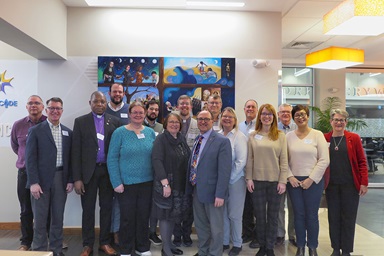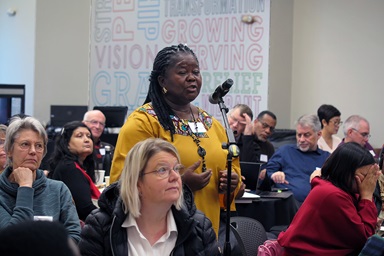Unfaithfulness in marriage and not being celibate in singleness can be considered chargeable offenses for United Methodist clergy.
In a May 4 session, delegates attending the United Methodist Church’s 2004 General Conference clarified immorality and identified the practices the church considers as violations of Christian teaching.
Delegates to the denomination’s top legislative assembly amended the paragraph in the Book of Discipline outlining chargeable offenses to clarify the language and to give bishops, pastors and other clergy and diaconal ministers a list of offenses that could result in a trial.
The delegates also expanded Paragraph 2702, which contains items for which clergy may be charged. Delegates added “being a self-avowed practicing homosexual, conducting ceremonies that celebrate homosexual unions and performing same-sex wedding ceremonies” to the list of offenses that might evoke a trial.
“The language speaks to the needs of our church at this time,” said Jon Gray, a delegate from Kansas City, Mo., and newly elected member of the denomination’s Judicial Council.
In a vote of 455-445, the delegates changed Paragraph 2702 to state: “A bishop, clergy member of an annual conference, local pastor, clergy on honorable or administrative location, or diaconal minister may choose a trial when charged (subject to the statute of limitations in 2702.4) with one or more of the following offenses: a) immorality, including but not limited to, not being celibate in singleness or not being faithful in a heterosexual marriage; b) practices declared by the United Methodist Church to be incompatible with Christian teaching, including but not limited to: being a self-avowed practicing homosexual; or conducting ceremonies which celebrate homosexual unions; or performing same-sex wedding ceremonies.”
What the decision does, Gib Walton of the Texas Conference says, is to place the various disqualifications for ordination found in Paragraph 304 into the chargeable offense section to increase the clarity for clergy of what constitutes an offense.
According to the Rev. Linda Campbell, New England Conference, it is important to be clear about every issue that is considered to be incompatible with Christian teaching. “Incompatible is incompatible,” she said.
Campbell said the church is increasingly moving toward what has been historically known as a period of inquisition, adding, “It has been very important for the inquisitor to have a clear definition of what it is the person ... is charged with.”
*Green is a United Methodist News Service news writer.
News media contact: (412) 325-6080 during General Conference, April 27-May 7. After May 10: (615) 742-5470.
Like what you're reading? Support the ministry of UM News! Your support ensures the latest denominational news, dynamic stories and informative articles will continue to connect our global community. Make a tax-deductible donation at ResourceUMC.org/GiveUMCom.



